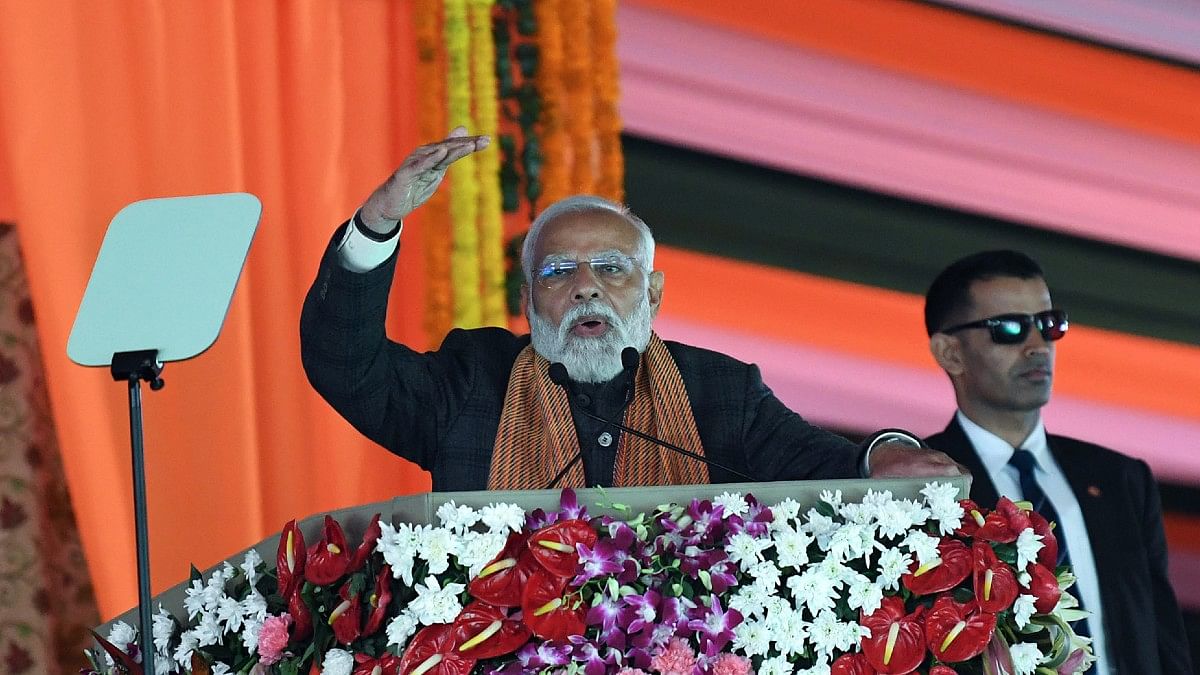New Delhi: In his first visit to the Kashmir valley after the abrogation of Article 370 in August 2019, and just weeks after the inauguration of the Ram temple in Ayodhya, Prime Minister Narendra Modi Thursday inaugurated the integrated developmental project of the Hazratbal shrine — also called Madina Sani (second Medina).
Coming weeks before the Lok Sabha election, the inauguration of the developmental project of one of the most important Muslim shrines in the country is steeped in political symbolism. Situated on the left bank of Kashmir’s famous Dal Lake, the Hazratbal shrine is believed to preserve ‘Moi-e-Muqqadas’ (the sacred hair of Prophet Muhammad’s beard).
For most commentators, the move is symbolic of the BJP’s consistent outreach to the Muslim community — in line with its political slogan of “Sabka Saath, Sabka Vikas, Sabka Vishwas”. This is particularly crucial as the party seeks to expand its voter base among Muslims from the estimated 8-9 percent in the upcoming elections through several campaigns and outreach programmes targeted specifically at the Muslim community.
“The messaging is pretty clear. On 22 January, there was the Ram temple inauguration in Ayodhya for the majority community, now this is for the minority community,” says Faizan Mustafa, former vice-chancellor of NALSAR University of Law, Hyderabad. “It is in line with the BJP’s stated policy that there will be appeasement for none, but justice for all.”
The move carries both electoral and diplomatic messages, Mustafa argues.
“Modi is arguably the most popular Indian prime minister in the Muslim world internationally, so this messaging has important diplomatic significance; but it also has domestic significance, given that a sizable section of Muslims has started seeing the BJP and Modi differently,” he says. “Through triple talaq, welfare schemes, etc., they have developed a constituency among Muslims, and this messaging is important for them.”
The move is in line with an increasingly evident, new model of “inclusive Hindutva”, wherein the top BJP-RSS leadership is being projected as being “moderate” towards Muslims, even as their affiliated outfits continue to practise radical, exclusive Hindutva politics.
“This has to be seen as an attempt by the BJP to create an interesting political equilibrium wherein there is both radical Hindutva and inclusive politics,” argues political scientist Hilal Ahmed.
“The immediate context of the expansion of the NDA also needs to be kept in mind — Nitish Kumar, BJD, Chandrababu Naidu are all coming back to the NDA fold, so the BJP has to cater to this NDA configuration even as it does not destabilise the Hindutva vote.”
Ahmed adds that one needs to remember that this is part of the party’s Sufi outreach.
Last year, the BJP’s minority morcha launched a year-long Muslim outreach programme called the “Sufi Samvad” with a special focus on the Muslim-dominated districts in Uttar Pradesh, Bihar, West Bengal, Kerala and Telangana.
Sufis, who belong to the Barelvi sect of Islam, are widely seen by the BJP-RSS as closer to the indigenous culture of India, as they pray at various dargahs spread across the country, and are seen to be a mix of pagan and Abrahamic traditions, as opposed to the more orthodox, monotheistic sects within Islam. The Hazratbal shrine, for instance, is an outcome of a very particular kind of Islam that emerged in India, so its invocation has to be seen in that context of a preference for an “Indian Islam”, Ahmed says.
In January this year, Modi and Union Minority Affairs Minister Smriti Irani met a nine-member delegation of Sufi clerics from shrines across India, and discussed with them a plan to develop a Sufi corridor which would link all the Sufi shrines in India, and would attract pilgrims from across the world.
The BJP and the RSS have traditionally batted for a more “Indianized” version of Islam.
In fact, the 1951 manifesto of the Bharatiya Jana Sangh said, “Jana Sangh considers them (Muslims) flesh of our flesh, the blood of our blood. …It looks forward to their disassociating foreign ways from the tenets of their religion. They are welcome to worship the Islamic way. They are expected to live the Bharatiya way.”
“This is a huge message to the Muslim community through J&K,” says Yaser Jilani, national media incharge of the BJP. “The Prime Minister has sent out a message of Kashmiriyat through this inauguration…and the images of this event will stun the world.”
He adds, “The Opposition is so shocked that it doesn’t know how to respond given that it has always predicated its politics on the lie that the BJP is anti-Muslim.”
Yet, several Muslim organisations have decried the inauguration Thursday as mere political posturing by the BJP.
It is very difficult to trust PM Modi given the controversies surrounding mosques and hate crimes, says Firoz Ahmad, president of the All India Muslim Majlis-e-Mushawarat (AIMMM), who terms the inauguration as “politically motivated”.
“What has he (Modi) done to the entire country? Now you think that you can change the situation by going there, then it cannot happen,” he adds.
(Edited by Amrtansh Arora)
Also Read: Origins & evolution of BJP’s dalliance with Shia Muslims, the ‘minority within minority’

